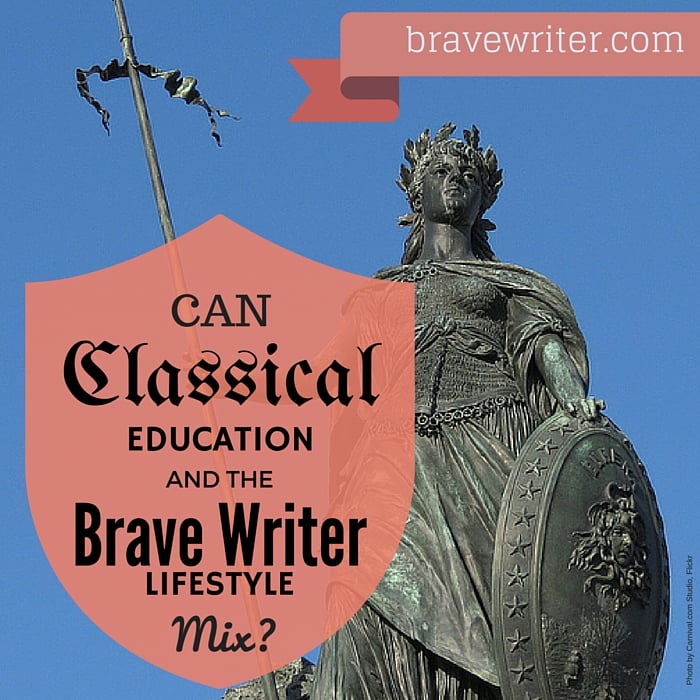
Adults can be drawn to the classical education model. We see what we haven’t learned and are in awe of the opportunity to learn it now, with our kids, hoping they will be the intellectual competents that we fear we are not.
[This post contains Amazon affiliate links. When you click on those links to make purchases,
Brave Writer receives compensation at no extra cost to you. Thank you!]
With the rise of The Well-Trained Mind, homeschoolers are now aware of significant gaps in their own educations. Most of us don’t remember learning the Greek myths, haven’t read The Illiad or The Odyssey, remember very little of our western civ coursework from college, and feel that any expository writing we did in college was more of a lick and a prayer than serious argument.
So we’re attracted to classical homeschooling. There’s so much to love about it!
Love the four year history rotation, love the integration of the sciences into history, love reading classical literature, love the classical argument models, love the immersion in myth and legend and tale and epic poem that is classical education.
Kids deserve to be expanded by
- great literature,
- myth,
- epic poetry,
- legend,
- artwork,
- history,
- scientific discovery,
- the stars,
- mathematics as a language (not just as a workbook),
- Shakespeare,
- theater,
- music,
- dance,
- and languages.
These sources provide rich material for imagination, vocabulary, and inner life. Such inner lives naturally spill over into writing with content and texture.
Each stage of development (grammar, logic, and rhetoric) offers new levels of personal expression and connection to these living source materials. Conversations, drawings, written narrations, transcription of great writing, mini dramas acted out, imitation, and metaphorical thinking (where one connects the past to present experience in a meaningful way) all give the ideas dimension and relevance to the student.

Can classical methods and Brave Writer mix? Yes!
So how does Brave Writer fit into this style of education? I love to say that joy is the best teacher. A happy mother makes a better home educator. The happiness must come from within, not from compliant children. So we begin with you. Begin the adventure of a classical education because you want one, not because your children should have one. You’ll need staying power to carry this course through. Your enjoyment of the lifestyle of classical education must be the fuel in your homeschool engine.
If a classical education model is what excites you, live it first, in front of your children. Read the classics (alone first, or a children’s version aloud). Get some commentaries to help you. You might start with Greek myths (they are so captivating and prevalent, and you will find lots of reinforcement in art and literature).
If you are new to epic poetry, pick out something like Beowulf, narrated by Seamus Heaney on CD and play it over breakfast, a little bit each day. Listen to the story and draw pictures of Grendel. Keep a little lexicon of terms that you define as you discover them. Play with them in sentences over breakfast when your listening is done.
If your kids are writers (9-10 or older), you can use a Friday Freewrite to write what you think will happen next, or to write a new ending, or to think about what Grendel may have felt in those last moments. (For those who don’t know, there is a book called Grendel that was written just for that purpose. You might check that out and compare it to your own speculations.)
You might write a new myth or create a Greek god (what god do you think the Greeks lacked and why?). Reinforce what you are learning not just through rote repetition, but using your imagination to make connections to our time, to our understandings.
Certainly any child who plays online games will make scores of connections since these games are rife with references to the ancient world in particular. Look up the names of characters and discover a pantheon of Egyptian and Phoenician gods that are hidden within the games.
Narration is key to a classical education because the ideas are unfamiliar and the vocabulary is often challenging. So talk over tea and in the car and over dinner. Take your time and keep the experience relevant to kids (don’t rely only on your sense that the material is important to “get them” to do their work). Our family spent two years solid on Ancient Greece, with our major concentration on Greek mythology. My kids know their myths backwards and forwards because they love them, not because they had to learn them.
Eventually this immersion in myths led to a fascination with epic poems, such as Gilgamesh. The results in our home: My daughter wrote her own Greek myth modeled after the ones she loved and my son wrote a screenplay for the story of Gilgamesh. These were not assignments, but spilled out of long term incubation and saturation with the material.
Want more on this theme? Our Writing a Greek Myth class is one of our most popular!

Image by Carnaval.com Studios (cc Modified to add text.)

















